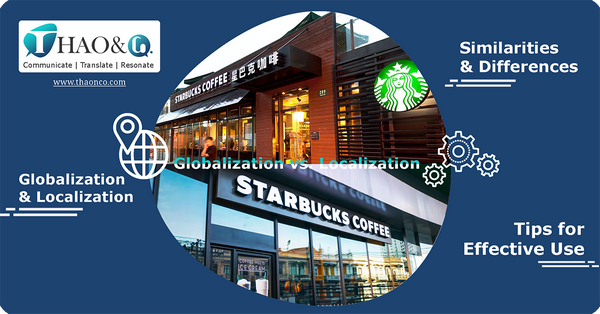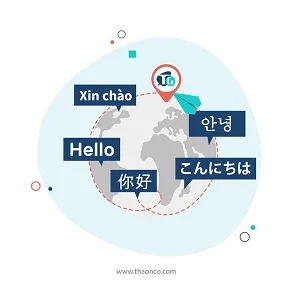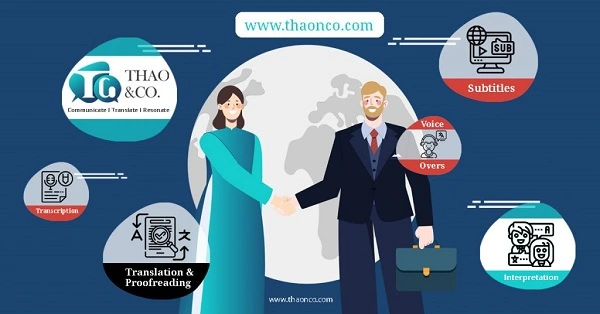The age of Industry 4.0 brings the processes of strong globalization and localization of enterprises all over the world. Therefore, their demands and criteria for globalization and localization significantly increase over time. Particularly, language is one of the essential tools that helps businesses go global or adapt to a local market.
In this article, Thao & Co. dives into the insights of globalization and localization – how they are connected to each other as well as how they affect translation needs and particularly, language standards in every translation project.
Globalization involves the interconnection of a country’s internal operations with the rest of the world through cross-border connections. Such connections encompass various areas, including the economy, culture, commerce, and services, among others. As a result, a universal set of rules is formed as global citizens operate and work on a global scale.
On the other hand, localization is the process of tailoring activities in different markets to align with the preferences of local audiences in specific regions, countries, or areas. Localization helps minimize language, cultural, and image barriers for products and services, ensuring their global relevance while conforming to local standards.
A world-renowned brand that has masterfully employed both globalization and localization strategies is Starbucks. When talking about Starbucks, most people will immediately think of the iconic green mermaid logo, a comfy and cozy ambiance along with excellent service quality. In every country, Starbucks flexibly transforms itself to better attract and appeal to local customers without straying too far from its established global image.
For example, Starbucks stores in Japan are deliberately designed to resemble local tea houses. The same goes in France where Viennese coffee, a local favorite, is incorporated into the menu. In the Chinese market where consumers prefer to hang out in groups, Starbucks has opted for tables in larger sizes in its stores.

Globalization and localization are closely intertwined and often go hand in hand in the development strategies of enterprises. Both elements exert a significant influence on each other at various stages, during different periods, and in pursuit of diverse business objectives.
When businesses prioritize globalization, their local market successes serve as an important support pillar. Conversely, a product or service developed on a global scale can gain a substantial advantage when entering a local market.
Localization examples include the adaptation of genres of gameshows and reality TV programs in various countries, such as the transformation of American Idol into Vietnam Idol or the Vietnamese version of the Korean show Running Man. In these instances, the cultural and human elements of each country are integrated and adapted appropriately.
Besides, several brands have achieved successful global integration, including Apple from the United States and Samsung from South Korea. These brands, originally local companies, have now become global providers.

Despite their close relationship, globalization and localization exhibit significant differences.
In terms of scope, globalization strives for widespread reach, expansion, integration, and scaling up to a larger landscape. This enables businesses to access multiple markets, countries, cultures, ethnicities, and demographics.
Conversely, localization aims for the adaptation and customization of a product, service, or business for a specific market, country, or culture.
Globalization seeks uniformity through a universal standard system. This global standard system ensures that businesses, products, and services maintain consistent quality and a high level of neutrality, making them suitable for any customer base worldwide.
On the other hand, localization aims for adaptation, modification, and customization to align with a local market’s preferences. This customization takes into consideration specific local standards, languages, and cultures, thereby making products and services more relevant and accessible to the target market.
Globalization promotes consistency while also guiding businesses, products, and services toward the use of one or several globally popular languages, such as English or Chinese.
In contrast, localization primarily utilizes local languages in specific locales where the localization campaigns take place to connect with the local markets and audiences.

To effectively implement globalization and localization, businesses must assess their capabilities and evaluate the potential of their products and services. This analysis will assist businesses in gaining a comprehensive understanding of their strengths, weaknesses, challenges, and opportunities, ultimately enabling them to achieve optimal efficiency, whether through globalization or localization.
If a business encounters challenges in simultaneously implementing both strategies, striking a balance between the two becomes imperative. In most cases, globalization strategies serve a long-term goal, complemented by various localization tactics. Precisely defining your development direction as well as short-term and long-term goals during every stage will be helpful in effectively implementing both strategies.
Whether it’s localization or globalization, language remains a key factor. Translation, therefore, holds significant importance in both strategies for business growth. It assists businesses in entering international markets more swiftly and accessing local markets more efficiently.
Understanding the importance of high-quality translation in both globalization and localization strategies, Thao & Co. stands as a reliable partner for businesses.

At Thao & Co., our team of highly experienced linguists is committed to delivering top-notch translation and localization services for apps, websites, software, games, technical documents, and more. By selecting Thao & Co., you can enjoy our professional localization process and a wide range of localization solutions designed to meet all your business needs:
For more information about our translation and localization services, please click here. Don’t hesitate to reach out to our experts at Thao & Co. via our Get a Quote page to kickstart your project today!